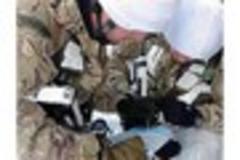 This is Cornwall --
This is Cornwall --As sub-zero temperatures and north-easterly winds gripped the region this week, many of us felt the need to wrap up.
But the cold weather in Devon and Cornwall was far more bearable than the Arctic conditions Westcountry Royal Marines have battled.
Hundreds of green berets from the Commando Logistic Regiment in Barnstaple, North Devon and their supporting air power, the Commando Helicopter Force at Yeovilton in Somerset, and Scotland-based 45 Commando completed six weeks of Arctic training.
Deep snow, ice and temperatures falling below minus 30 degrees (plus another 20 degrees with the wind chill factor) in Northern Norway present a challenge like no other in the world.
"There is no harsher environment in which to live, work and fight," a Royal Marines spokesman said. "Such conditions test men and machines to the limit."
The marines staged a heavy assault in Northern Europe on one of the relics of Hitler's vaunted "fortress Europe"– a military propaganda term for the areas of Continental Europe occupied by Nazi Germany during the Second World War – as the climax of their cold weather training exercise. The forces, who are ready to deploy around the world at short notice, had left their UK bases to join Norwegian forces at the small port of Harstad, some 150 miles north of the Arctic Circle.
One of their first and biggest challenges was to master the art of survival in Arctic conditions, including living in man-made caves carved out of the snow and marching wearing snow shoes for 5km with 30kg on their backs.
The fighting element of the training reached a climax at the Trondes Peninsula on the northern side of Harstad harbour, and at Batterie Theo – the site of the formidable relic of the infamous Third Reich called Batterie Theo – today known as Trondesnes Fort.
The fort was part of the Atlantic Wall – the chain of defences built by the Germans from Biscay to the North Cape to prevent the Allies storming Fortress Europe.
It previously housed four mighty 40.6cm cannons that could hurl a 1,030kg shell up to 56 km.
The Norwegian Army defended the fort against the marines who staged a three-hour assault, launching simultaneous "attacks" on three enemy positions.
Three Norwegian helicopters and Royal Naval Fleet Air Arm "Jungly" Sea Kings of Yeovilton then swept the fjord to find the troops and take them off the ground.
Marine Tony Curtis, 19, said: "It's been good to put into practice the skills we've learned over the past month. This is my first time in Norway and fighting in the extreme cold is a totally different challenge entirely."
After Arbroath-based 45 Commando finish their year-long stint as the on-call commando unit in May the green berets of 42 Commando at Bickleigh near Plymouth will take over the duty.
Meanwhile Westcountry marines crossed the Channel to take part in a separate exercise with French colleagues. Members of 42 Commando's M Company of 42 took part in Exercise Gaelic Venture – a joint Anglo-French exercise between 3 Commando Brigade and 9 Brigade Infanterie de Marine.
The short exercise was intended to build on Anglo-French military relations and develop an understanding of the different operating procedures.
It involved a 20km "yomp" and communications testing involving two languages, before the British and French companies carried-out a simultaneous assault on two "enemy" strong-points.
Once the attacks were over the marines established themselves on the French "enemy" positions overnight.
A spokesman for 42 Commando said: "We proved ourselves an impressive surveillance asset throughout, surprising our French hosts as we routinely contacted counter-attacks before they had even successfully located our harbour.''
After the exercise the Royal Marines went on a two-day battle-field tour of Normandy to visit sites of Second World War amphibious action. Reported by This is 2 days ago.